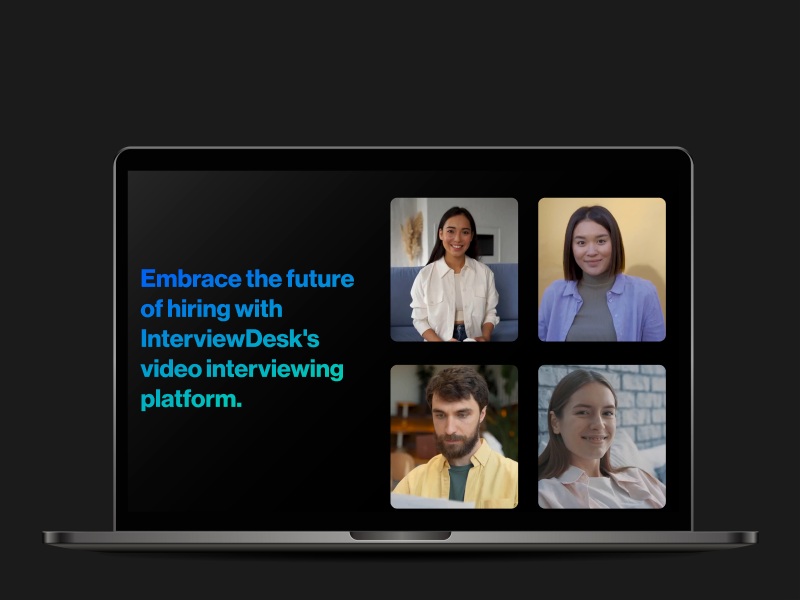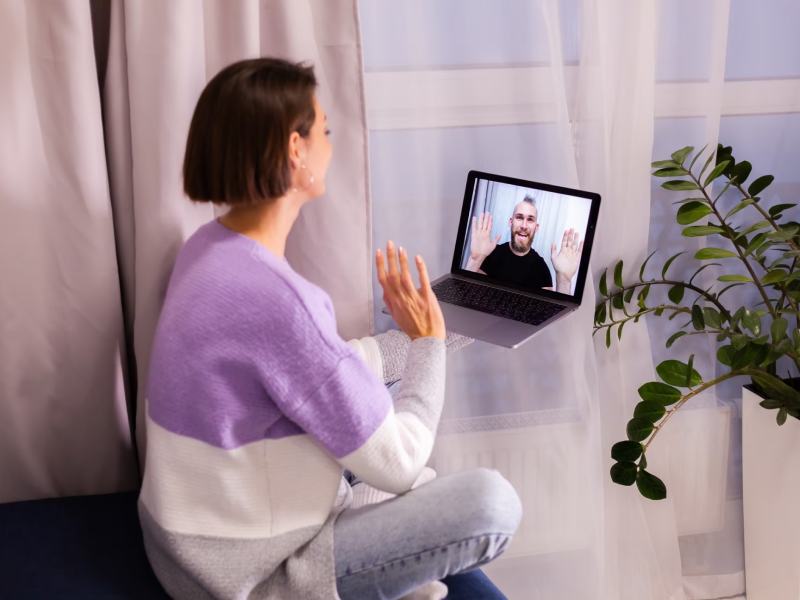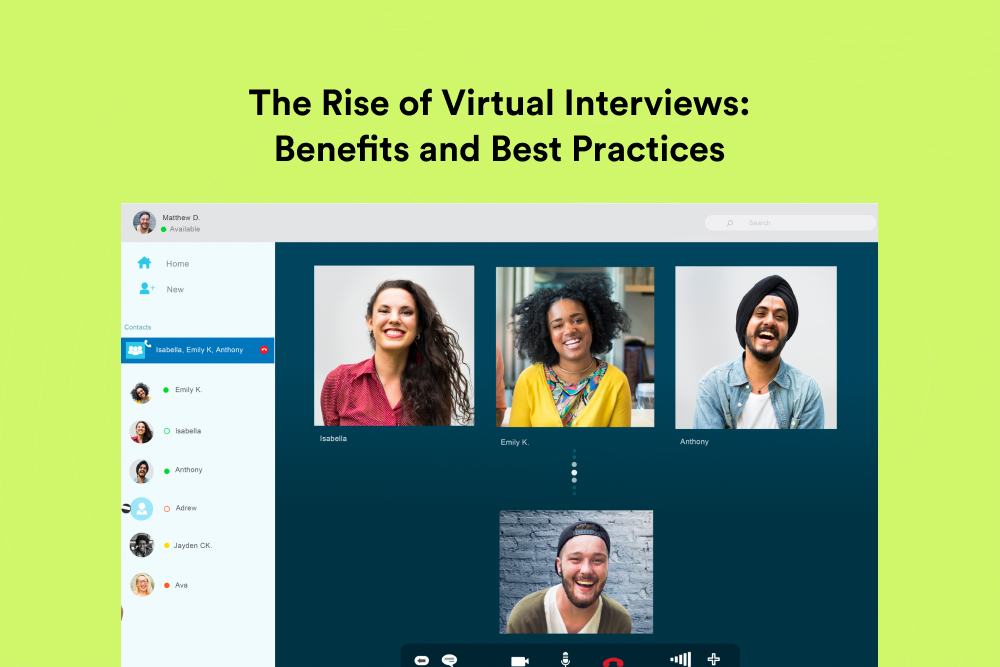Virtual interviews have become increasingly popular in the modern job market, offering numerous benefits for both employers and candidates. With the advent of technology and the recent challenges posed by the COVID-19 pandemic, virtual interviews have emerged as a practical and efficient alternative to in-person interviews. In this post, we’ll examine the different benefits of doing virtual interviews and offer best practices for doing so effectively. If you’re an employer looking to speed up the hiring process or a job seeker navigating the realm of virtual interviews, this article will empower you with the knowledge and skills necessary to thrive in this new era of recruiting.
Understanding the Shift to Virtual Interviews
Before delving into the benefits and best practices of virtual interviews, it is crucial to comprehend the underlying factors driving this shift. The convergence of technology and recruitment strategies has revolutionized the hiring process, influencing the way employers connect with potential candidates.

The Impact of Technology on Recruitment
Advancements in technology have disrupted various industries, including recruitment. Virtual interviews have replaced traditional in-person ones as firms look to streamline their hiring procedures and tap into a larger talent pool. Technology enables employers to assess candidates remotely, eliminating the need for expensive and time-consuming travel arrangements.
Employers can now conduct interviews from the convenience of their own workplaces thanks to the development of video conferencing platforms and specialized interview software.
This not only saves time and money, but it also gives scheduling interviews more flexibility. Candidates no longer have to worry about taking time off work or arranging childcare, as they can participate in virtual interviews from any location with an internet connection.
Furthermore, technology has also improved the assessment process. Employers can evaluate applicants’ abilities and competences in a number of ways, for as through simulations and online tests. These assessments can be conducted in real-time during virtual interviews, providing immediate feedback to both the employer and the candidate.
The COVID-19
The outbreak of the COVID-19 pandemic has accelerated the adoption of virtual interviews in unprecedented ways. With social distancing measures in place and organizations adapting to remote work setups, virtual interviews have become the go-to method for conducting job interviews. Even beyond the pandemic, it is anticipated that virtual interviews will remain an integral part of the recruitment landscape.
During the height of the pandemic, when travel and in-person interactions were restricted, virtual interviews emerged as a lifeline for both employers and candidates. Without endangering the wellbeing of their workers and prospective candidates, businesses were allowed to carry out their hiring procedures. Candidates, on the other hand, could pursue job opportunities without the fear of contracting or spreading the virus.
In addition to the immediate benefits brought about by the pandemic, virtual interviews have also presented long-term advantages. Employers now have access to a much larger talent pool, as geographical limitations no longer pose a barrier. By utilizing talent from other towns, states, and even foreign nations, they can increase their alternatives and the diversity of their staff. By utilizing talent from other towns, states, and even foreign nations, they can increase their alternatives and the diversity of their staff.

Virtual interviews have also proven to be more efficient and cost-effective. Employers can conduct multiple interviews in a single day, without the need for travel arrangements or meeting room bookings. This streamlining of the interview process allows companies to make quicker hiring decisions, reducing time-to-fill and ensuring that top candidates are not lost to competitors.
Furthermore, virtual interviews have opened up new possibilities for remote work and distributed teams. Employers are now more open to hiring candidates who can work remotely, as they have become accustomed to managing remote teams during the pandemic. This trend towards remote work offers more freedom for both businesses and individuals, improving work-life balance and job satisfaction.
As the world continues to navigate the challenges brought about by the COVID-19 pandemic, virtual interviews have become a vital tool in the recruitment process. They have shown that they can be effective, successful, and adaptable, providing a window into the employment of the future. Whether it is due to technological advancements or the need to adapt to unprecedented circumstances, virtual interviews are here to stay.
The Advantages of Virtual Interviews
Virtual interviews offer numerous benefits that make them an attractive option for both employers and job seekers.
Virtual interviews have gained popularity in recent years due to their many advantages. Employers and job seekers alike have recognized the cost and time efficiency, wider geographical reach, and flexibility and convenience that virtual interviews provide.

Cost and Time Efficiency
One of the key advantages of virtual interviews is their cost and time efficiency. Instead of allocating resources for travel and accommodation, employers can save time and money by conducting interviews remotely. This is especially beneficial for companies that have multiple interview rounds or candidates from different locations. By eliminating the need for physical travel, virtual interviews streamline the hiring process and make it more efficient. Likewise, candidates can avoid the expenses associated with traveling to interview locations, allowing them to focus on preparing for the interview itself.
Furthermore, virtual interviews also save valuable time for both employers and candidates. Traditional face-to-face interviews often require extensive scheduling and coordination, taking into account the availability of both parties. With virtual interviews, employers can easily schedule interviews at their convenience, without having to worry about travel arrangements or meeting room availability. This flexibility enables for a hiring procedure that is more streamlined and effective while also saving time.
Wider Geographical Reach
Virtual interviews break down geographical barriers, providing employers with access to a larger talent pool. Whether a candidate is located in a different city or even a different country, virtual interviews enable employers to connect with individuals regardless of their physical proximity. This improves the number of available candidates for the position and the likelihood that the best candidate will be found.
Furthermore, virtual interviews also benefit job seekers by opening up opportunities that may have been geographically limited in the past. Candidates who may not have been able to relocate for an in-person interview can now showcase their skills and qualifications through virtual platforms. This not only gives job searchers more choices, but it also enables employers to access a varied global labor pool.
Flexibility and Convenience
Virtual interviews offer unparalleled flexibility and convenience for both employers and candidates. With virtual interviewing platforms, employers can schedule interviews at their convenience, accommodating candidates across different time zones. This reduces the requirement for protracted back and forth communication and enables more effective scheduling.
Additionally, candidates can take part in interviews from the convenience of their homes, forgoing long commutes or taking time off work. This convenience not only reduces stress for candidates but also allows them to be in a more relaxed and comfortable environment during the interview. Candidates can also easily access any materials or resources they may need during the interview without having to carry them around or worry about forgetting something.
Furthermore, virtual interviews also offer flexibility in terms of technology. Depending on their inclination and availability, candidates can choose to take part in virtual interviews utilizing a variety of devices such laptops, tablets, or smartphones. This flexibility ensures that candidates can engage in the interview process regardless of their technological resources.
In conclusion, virtual interviews provide numerous advantages for both employers and job seekers. The cost and time efficiency, wider geographical reach, and flexibility and convenience make virtual interviews an appealing option in today’s digital age. Virtual interviews are anticipated to become more common in the employment process as technology develops, revolutionizing the way companies interact with prospects.
Best Practices for Conducting Virtual Interviews
To ensure successful virtual interviews, certain best practices should be followed by employers. There are various other elements that can help to a fluid and successful virtual interview experience in addition to the core elements stated above.
Ensuring a Stable Internet Connection
A stable internet connection is crucial for a seamless virtual interview experience. Employers should test their internet connection prior to the interview and make necessary arrangements to minimize the risk of technical disruptions. Having a backup strategy is also important in case of internet interruptions.
Instead of relying exclusively on Wi-Fi, adopting a cable connection can help assure a steady internet connection. Wired connections tend to be more reliable and provide a faster and more consistent internet speed. Employers can also consider using a dedicated internet line for virtual interviews to minimize the chances of interruption.
Creating a Professional Environment
When conducting virtual interviews, it is important for employers to create a professional environment. This includes selecting an appropriate background, such as a quiet and well-lit room, to minimize distractions. Additionally, employers should dress professionally and maintain a composed demeanor throughout the interview.
Creating a professional environment also involves ensuring that the interview platform or software being used is user-friendly and reliable. Employers should select a platform that allows for smooth video and audio communication, as well as features like screen sharing, if needed. Familiarizing oneself with the platform’s functionalities beforehand can help avoid any technical difficulties during the interview.
Preparing for Technical Issues
Despite careful preparations, technical issues can still arise during virtual interviews. Employers need to be equipped to fix any potential technical issues. Having a dedicated technical support team or resource can help address these issues promptly, ensuring a smooth and uninterrupted interview process.
In addition to technical support, employers can also consider providing candidates with a backup contact method, such as a phone number or alternative email address, in case of any unforeseen technical difficulties. This ensures that communication can still take place, even if there are issues with the interview platform.
Employers should also have a backup plan in place in case of significant technical difficulties. This could involve rescheduling the interview or finding an alternative method, such as conducting the interview via phone or resuming it at a later time.
By following these best practices and considering additional factors, employers can conduct virtual interviews with confidence, providing a positive experience for both themselves and the candidates. Virtual interviews, when executed effectively, can be a valuable tool in the hiring process, allowing for flexibility and accessibility while still maintaining a professional and efficient approach.
Tips for Job Seekers in Virtual Interviews
Job seekers can enhance their performance in virtual interviews by following these helpful tips.
Dressing Appropriately for Video Interviews
Although virtual interviews allow for a certain degree of flexibility, it is important for job seekers to dress professionally. Dressing appropriately demonstrates respect for the interview process and portrays a positive image to the employer. Avoiding distractions in attire, such as loud patterns or excessive accessories, is also recommended.
Mastering the Art of Virtual Communication
Virtual communication presents unique challenges, and job seekers should be equipped to navigate these effectively. Maintaining good eye contact by looking into the camera, speaking clearly and concisely, and actively listening are all essential skills for successful virtual communication. Practicing these skills prior to the interview can help job seekers appear confident and articulate.
Handling Technical Glitches Gracefully
Technical glitches can happen unexpectedly, but how job seekers respond to these challenges can make a lasting impression. Remaining calm and composed, politely addressing the issue, and communicating any concerns to the interviewer can help mitigate the impact of technical glitches. Being adaptable and flexible demonstrates problem-solving abilities and a willingness to overcome obstacles.
As the world continues to embrace remote work and technology, virtual interviews are here to stay. Employers and job seekers alike can benefit from understanding the advantages of virtual interviews and employing best practices to optimize this new approach to recruitment. By embracing virtual interviews, organizations can tap into a wider talent pool and streamline their hiring process, while job seekers can showcase their skills and abilities in a convenient and accessible manner. With the right preparation, virtual interviews can unlock new opportunities and pave the way for success in the evolving job market.










